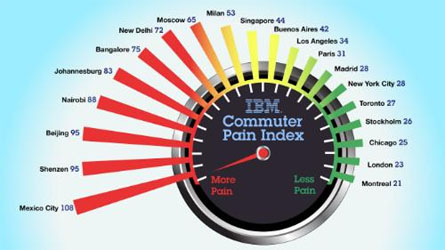How to Store More on Mobile Phones and Cloud
A new technology promises low-cost, faster and more durable memory applications for consumer devices, including mobile phones and cloud storage, as well as high-performance applications, such as enterprise data storage.
For the first time, scientists at IBM Research have demonstrated that a relatively new memory technology, known as phase-change memory (PCM), can reliably store multiple data bits per cell over extended periods of time.
The benefits of such a memory technology would allow computers and servers to boot instantaneously and significantly enhance the overall performance of IT systems, says IBM. So, PCM can write and retrieve data 100 times faster than flash, enable high storage capacities and not lose data when the power is turned off.
Unlike flash, PCM is also durable and can endure at least 10 million write cycles, compared to current enterprise-class flash at 30,000 cycles or consumer-class flash at 3,000 cycles.
[ Also Read: IBM Study on Connected Health Devices ]While 3,000 cycles will out live many consumer devices, 30,000 cycles are orders of magnitude too low to be suitable for enterprise applications.
“As organizations and consumers increasingly embrace cloud-computing models and services, whereby most of the data is stored and processed in the cloud, ever more powerful and efficient, yet affordable storage technologies are needed,” states Dr. Haris Pozidis, manager of Memory and Probe Technologies at IBM Research – Zurich.
[ Also Read: Ali Shadman Reveals the Secrets of Cloud Computing ]“By demonstrating a multi-bit phase-change memory technology which achieves for the first time reliability levels akin to those required for enterprise applications, we made a big step towards enabling practical memory devices based on multi-bit PCM.”
To achieve this demonstration, IBM scientists in Zurich used advanced modulation coding techniques to mitigate the problem of short-term drift in multi-bit PCM, which causes the stored resistance levels to shift over time, which in turn creates read errors.
Up to now, reliable retention of data has only been shown for single bit-per-cell PCM, whereas no such results on multi-bit PCM have been reported.
[ Also Read: HP to Offer webOS Pivot for HP TouchPad ]The PCM research project at IBM Research – Zurich will continue to be studied at the recently opened Binnig and Rohrer Nanotechnology Center.
The center, which is jointly operated by IBM and ETH Zurich as part of a strategic partnership in nanosciences, offers a cutting-edge infrastructure, including a large cleanroom for micro- and nanofabrication as well as six “noise-free” labs, especially shielded laboratories for highly sensitive experiments, says IBM.
The announcement was made Thursday, June 30.
Photo courtesy: IBM




